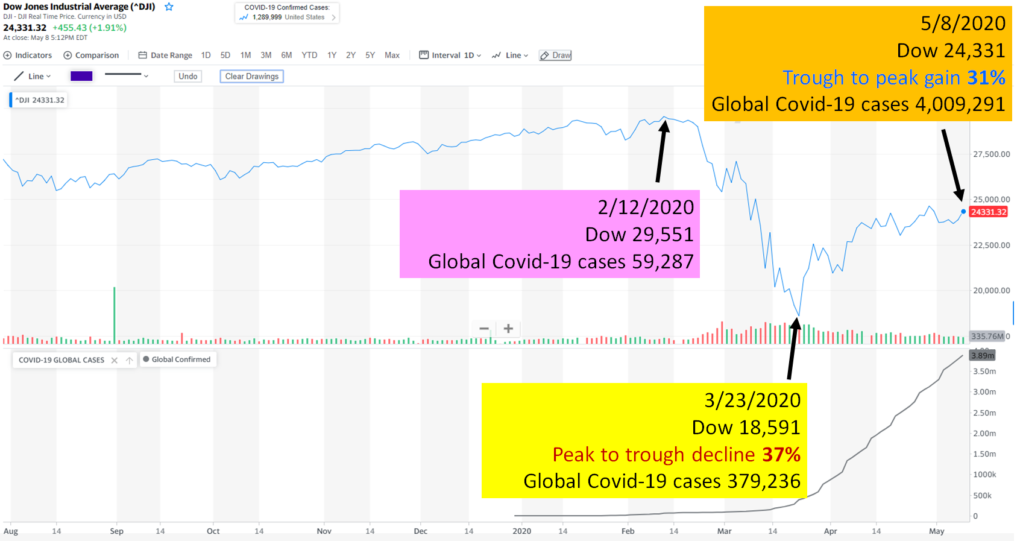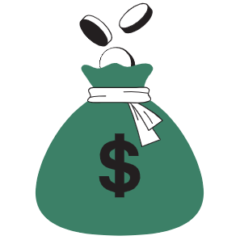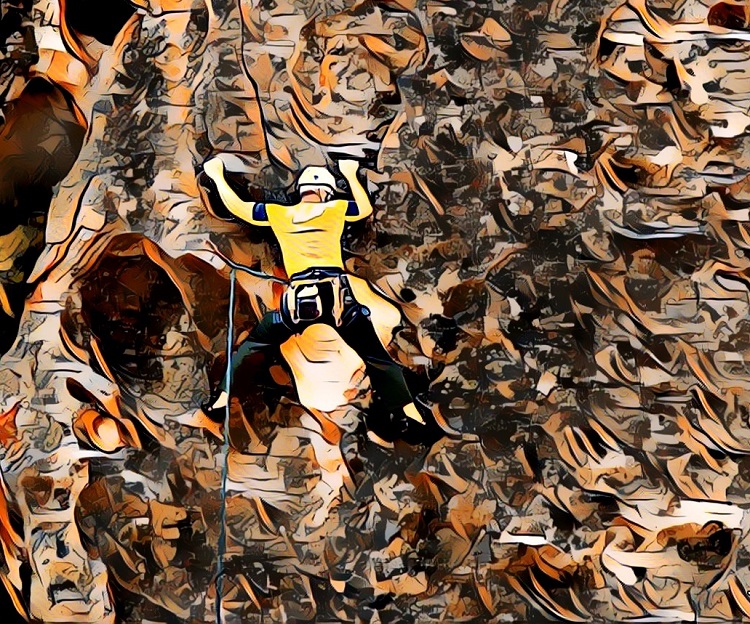Warren Buffett says that investing is simple but not easy. Indeed.
Let us reconcile these two data points from two different news sources at the onset of the Corona virus pandemic.
The US economy lost 20.5 million jobs in April, the Bureau of Labor Statistics said Friday — by far the most sudden and largest decline since the government began tracking the data in 1939.
Record 20.5 million American jobs lost in April. Unemployment rate soars to 14.7% by Anneken Tappe, CNN Business, May 8, 2020
The next day, this from Business Insider…
Dow surges 455 points as economic-reopening hope overshadows historic job losses.
Business Insider, Carmen Reinicke, May 9, 2020
Or how about this. The Dow peaked at 29,551 on Feb 12th, 2020 when the worldwide Corona virus cases were just getting started.
By March 3rd, 2020, the Dow would fall by 37 percent to 18,591, likely the steepest, fastest fall ever. The global recorded virus cases stood at 379,236 that day.
But then out of nowhere, the Dow changed direction, rocketing 31 percent off the lows while the virus cases kept on surging.

And that sharp violent turn off the bottom, that is a 2,100 points (11 percent) gain in a single day, likely the largest ever.
That by the way is typical. Most gains occur in a handful of days when you, yes you, least expect it – another reminder that you cannot time these things.
But the economic news continued to remain grim.
So, what warranted that surge in stock prices? How could we have had double digit unemployment with the world literally having changed and yet, the stock market responds as if we are back?
That is because the stock market is a discounting mechanism. It discounts the future to arrive at values today.
So, say you own a piece of a business that was supposed to generate a certain series of annual profits in the future. The stock market takes those profits into account to come up with a fair value for that business and that is what we see quoted each day.
And then the pandemic happens. That could impair a few years’ worth of those profits, resetting the value of that business.
But then the market senses that the news is not as grim as what was initially presumed and hence the value of that business gets repriced.
There is no guarantee though. The market’s assessment could be wrong, and it does get things wrong every now and then but that is in the short-term. Eventually though, the price and the value of a business will converge.
No one can of course predict these things. You look up January 2020 cover of any reputable publication right before the pandemic and not a mention of how our world was about to change.
And no one knew how long it would take for things to normalize from the depth of the pandemic or what form that normalizing would take. Most were just voicing opinions, just like this one by Jeremy Siegel, professor of finance at the Wharton School of Business in this MarketWatch piece…
We’ve seen the lows in March’ for the stock market, says man who called Dow 20,000 in 2015, ‘and we will never see those lows again.
Did he know? Not really.
Neurologist turned investment adviser, William Bernstein says that the people who are the best at something tend to be consumed by self-doubt, whereas the people who are incompetent are almost, always supremely self-confident. Prof. Siegel of course is not in that camp but that is the reality in general.
And it makes sense. If you are not confident in whatever trade you are in and if you wanted to get better, you’d work at it. But you will never get there because the more you dig in, the more there would be things to learn and relearn. So, you keep on digging for more and you keep on getting better at it.
And hence it is no surprise that the very best doctors tend to be consumed by self-doubt. The real quacks on the other hand, are always uber-confident.
It is the same with investing. If you think you have cracked the code, that is a dangerous sign.
But cracking the code is not what it is all about because if you’ve got the process right, grounded in the fundamentals of investment finance and a knack to continuously adapt and learn, you’d have the conviction to stick through whatever the markets throw at you.
And that is what ultimately counts.
Thank you for your time.
Cover image credit – Brett Sayles, Pexels

